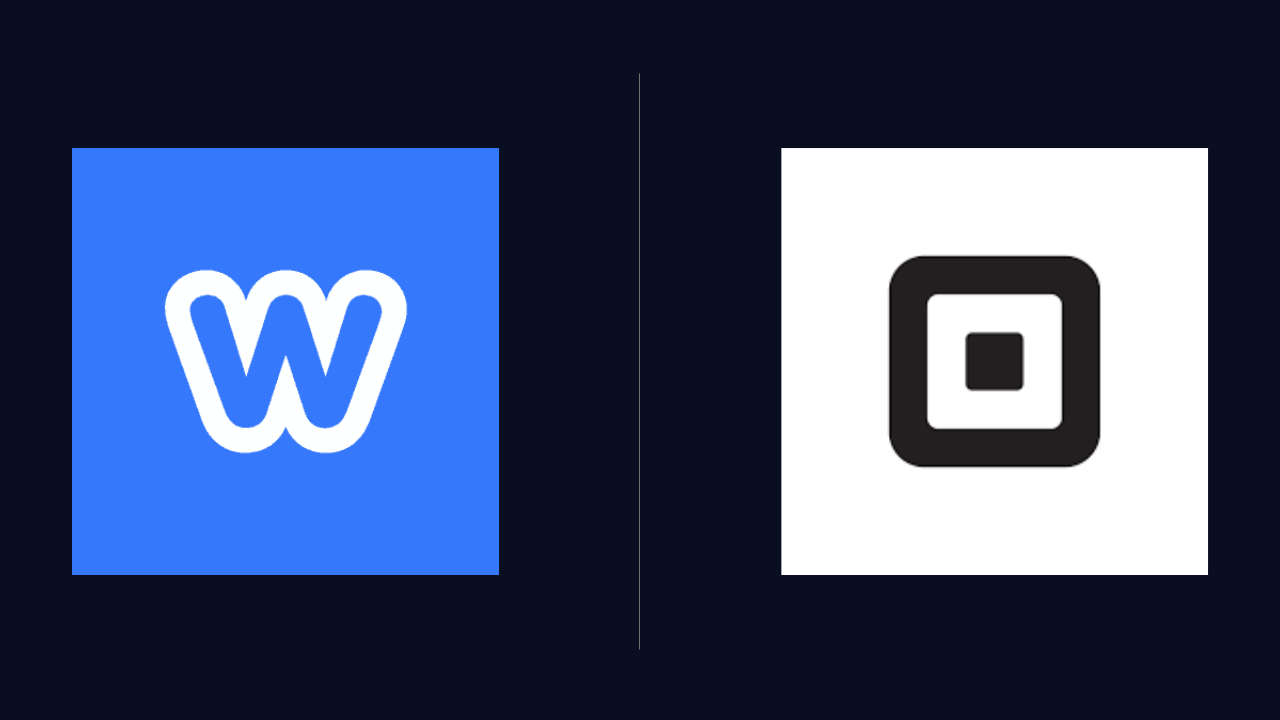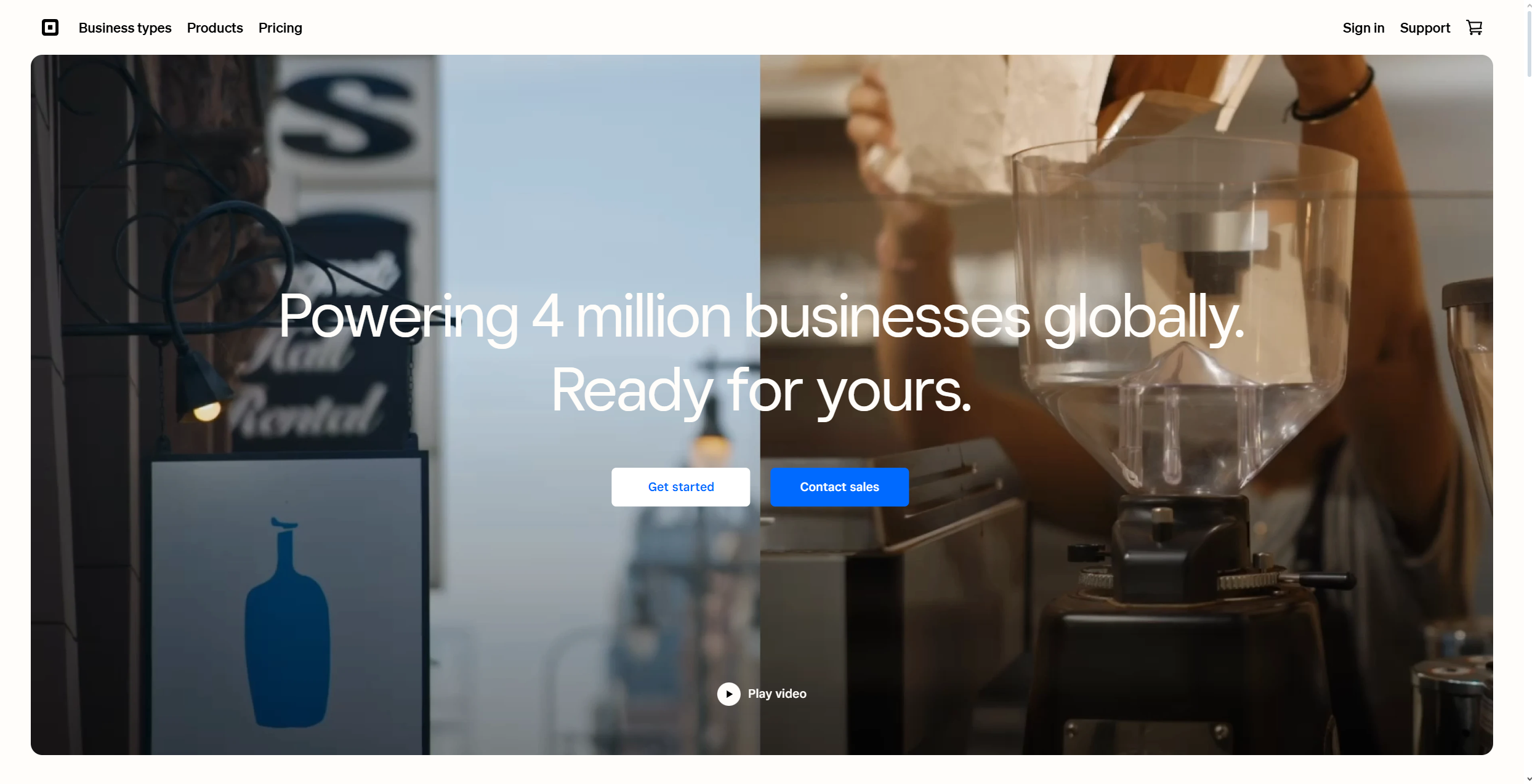Weebly vs Square: What's the difference?
Both owned by the same company, but how do they differ?

Weebly is among the best website builders, assisting more than 50 million sites globally with its simple drag-and-drop editor. In 2018, Square acquired Weebly with the goal of turning it into a simpler version of its ecommerce platform. Weebly is known for being user friendly and affordable, offering plans ranging from $10 to $26 per month, and there is a limited free plan.
Square's website builder partially employs Weebly's technology, while still being a solid ecommerce player in its own right. It is unique in that it integrates with Square's numerous business tools, such as payment processing and inventory management. That makes it a suitable option for businesses that need everything in one place, with plans ranging from $0 to $72 per month.
Weebly and Square are similar, but not identical, which can make things a little confusing. Weebly still assists small online stores that need something simple and inexpensive, but, Square's option is more comprehensive especially if you use Square's point-of-sale systems too.
Weebly is a user-friendly website builder that powers over 50 million websites worldwide. The platform specializes in drag-and-drop functionality and basic e-commerce features, making it ideal for small businesses and entrepreneurs looking to establish an online presence quickly.
For
- Intuitive drag-and-drop interface
- Affordable pricing tiers
- Free plan available
- Extensive app marketplace
- Mobile-responsive themes
Against
- Limited design flexibility
- Basic SEO features only
- Restricted payment gateway options
- Limited marketing tools
- Customer support availability restricted
Square's website builder combines robust e-commerce capabilities with comprehensive business management tools. The platform leverages Weebly's technology while adding advanced features for inventory management, payment processing, and multi-channel selling.
For
- Complete business management suite
- Advanced POS integration
- Comprehensive payment solutions
- Strong security features
- 24/7 premium support available
Against
- Higher pricing tiers
- Limited template options
- Steeper learning curve
- Complex feature navigation
- Design customization restrictions
Feature | Weebly | Square |
|---|---|---|
Ease of Use | User-friendly drag-and-drop interface with 7-step guide for beginners | Simple drag-and-drop interface with Editor Tips button |
Pricing | $0-$26/month with free plan | $0-$72/month with free plan |
Templates | 50 themes (15 for online stores) | Single default template with extensive customization options |
E-commerce Features | Basic features suitable for small businesses, integrated with Square POS | Advanced features with inventory tracking and abandoned cart recovery |
App Marketplace | 400+ apps in 5 categories | Growing marketplace with delivery and scheduling apps |
Payment Processing | Integrated with Square POS, supports multiple payment gateways | Native Square payments with competitive transaction fees |
Marketing Tools | Weebly Promote email marketing tool, basic social media integration | Advanced email marketing, social media integration, and analytics |
Mobile Optimization | Responsive design for all devices | Fully optimized for mobile commerce |
SEO Tools | Basic SEO tools with limited automation | Built-in SEO tools with blogging support |
Customer Support | Knowledge base, community forums, direct support | 24/7 customer support |

Weebly vs Square: Features
Weebly is one of the best website builders for small business with a uniquely easy to use website creator, more than 50 professionally designed templates, and complete drag-and-drop capabilities. The platform offers basic ecommerce functionality, with product adds, stock management, and search engine-optimized product page building. Through Square integration, Weebly offers the capacity for accepting payments both online and offline, selling gift cards, managing customer reviews, and shipping labels with customizable email templates.
Weebly's levels of customization and functionality are more limited than other platforms. While users are able to include basic HTML, CSS, and JavaScript in sites, the platform's App Center offers fewer integration choices than competitor platforms, limiting somewhat the capability for additional functionality.
Square Online's platform is aimed at offering strong business management and sales solutions and not extensive design functionality. Its strength is its comprehensive toolset for inventory, employees, and customer data, and it is thus especially beneficial to businesses with online and offline sites. The platform offers more than 300 integrations through its app marketplace, aimed at many aspects of business operations such as delivery, ordering, booking, and inventory management.
Square's ecommerce functionality is targeted to its POS system, with an integrated experience for businesses employing Square for offline sales. The platform offers advanced functionality such as inventory tracking and abandoned cart recovery, though it offers fewer design customization options with only about 28 templates to choose from.
When comparing both sites' functionalities, Square is a more feature-packed solution for businesses needing robust sales and management functions. Weebly, however, provides a more straightforward solution with more emphasis on site building and basic online shopping functions. Integrating the two sites allows businesses to utilize the simple website builder of Weebly and yet benefit from the robust business management functions of Square.
Weebly vs Square: Ease of use
Weebly is extremely easy to use thanks to its uncomplicated drag-and-drop setup process. The site provides straightforward ways of adding new content to pages and modifying settings, although there are comments that there can be delays with the editor. The system includes useful tools such as info buttons, pop-ups, and a checklist to assist users in building the site.
Square's site is more geared towards useful functionality rather than complicated design, and it is more accessible for businesses transitioning from in-store to online sales. The site is designed to be simple, particularly for users who are familiar with Square's POS system, although it has fewer options to offer for personalizing compared to specialized website builders for that purpose.
Both platforms provide sufficiently to meet different users' requirements. Weebly is appropriate for users who want to build a site quickly without necessarily needing technical expertise, while Square is appropriate for businesses needing an all-in-one solution to manage both online and offline business. The integration of Weebly's simple website builder and Square's business functions provides a robust yet friendly solution for small business owners.
Weebly vs Square: Customer support
Weebly provides various means of getting support, depending on your subscription option. Basic subscribers get online self-help guides and community forums. Professional plan subscribers get email support. Enterprise subscribers get additional features such as live chat and priority support from the Customer Success team. Support is available Monday through Friday, 6 AM to 6 PM Pacific Time.
Square provides more comprehensive support channels such as phone, email, and chat support. Customer support is available Monday through Friday, 6 AM to 6 PM Pacific Time, with 24/7 support for more premium subscriptions such as Square for Restaurants Pro. Square employs real product experts who collaborate with engineers to address technical questions, but it takes time to speak to a human agent due to the automated system.
When it comes to taking into account the support of both websites, Square is more convenient to access due to its direct phone support and expert representatives. However, both websites have some limitations to availability outside business hours unless users subscribe to premium plans. Since the two services are hosted together, users can access both support systems based on what they require.
Weebly vs Square: Security
Weebly values security through the employment of in-built SSL certificates and automatic platform updates to address vulnerabilities. The platform handles server-side security such as firewall protection so that websites on the platform remain secure without users requiring technical expertise. All sites have custom TLS certificates that are easy to enable to secure transactions.
The platform takes extra measures to protect user data and has features to prevent unauthorized access to sensitive information. Security patches are automatically applied to keep the platform safe and patch potential vulnerabilities as they arise.
Square uses advanced encryption methods to protect data while it is being transmitted and stored, with a strong focus on protecting sensitive customer information. The platform mandates sensitive data to be encrypted during storage on disk or when transmitted over public networks, and it has strong access controls on sensitive data, application data, and cryptographic keys.
Square's security model includes diligent monitoring of each transaction and ongoing development in the prevention of fraud. The platform has strong security measures, including two-factor authentication requirements, strong password controls on admin access, and ongoing security systems testing by trained personnel within and outside the company.
Both platforms have impressive security features that are easy to learn, so they are easy to use for those with limited technical knowledge. While Weebly prioritizes core security features with automatic management, Square provides a more robust security system, which is especially useful for businesses processing sensitive payment data and customer data.

Weebly vs Square: Tools, add-ons, and extras
Weebly's App Center has over 350 apps and integrations across five categories: e-commerce, communication, marketing, social media, and site tools. The platform offers crucial add-ons such as social feeds, contact forms, live chat support, and numerous e-commerce apps that manage shipping and order fulfillment. Although Weebly's marketplace offers ample free alternatives, it lacks some crucial integrations such as MailChimp and ChowNow, and thus the users must manually embed codes for these services.
Weebly has recently augmented its platform with AI-driven features, particularly in content creation and photo editing. Weebly's Photo Studio app, powered by artificial intelligence, allows users to remove backgrounds, adjust contrast, and optimize images for use on social media, online menus, and marketing campaigns. The platform constantly updates and guarantees to support its website builder until at least July 2025.
Square's ecosystem offers a full set of add-ons designed for business operations, including advanced inventory management, employee scheduling software, and marketing tools. The platform features special tools such as Square Loyalty for customer loyalty, Square Messages for single-messaging, and Square Email Marketing for automated marketing. Most of these tools are available through Square's Add-on Library, with some of them being free and some others demanding subscription fees.
Square has also invested heavily in building payment technology, recently extending offline payment capabilities to its entire hardware line across the globe. The platform is simple to integrate with various third-party services and features special tools for various industries, ranging from restaurants to healthcare providers.
If we look at what each platform has to offer, Square is a better option with its business tools and ongoing updates in payment technology. Weebly has good website-building tools and apps, but the former platform has better business management tools and solutions for industries that can adapt with businesses.
Weebly vs Square: Hardware
Weebly mainly builds websites and does not provide physical hardware. Instead, it focuses on software tools and connections that can run on any device and system, allowing users to manage their online presence with any device with an internet connection.
Square provides a range of hardware options, from simple card readers to full point-of-sale systems. Options include a free magnetic stripe reader, mobile card readers that begin at $59, the iPad-based Square Stand that is $149, and the high-end Square Register that is $799 with two screens. The company also provides rental plans for hardware through its partnership with Fello for temporary events like festivals and trade shows.
The hardware comparison is largely in favor of Square because it provides many physical tools for payment processing. Weebly is strong in the digital realm, but, Square provides real solutions for businesses that must accept payments offline, making it a more practical option for businesses that have an online and offline presence.
Weebly vs Square: Pricing
Weebly offers four plans, starting with one of the best free website builder plans on the market. Paid plans are $10 to $26/month if paid annually. The Personal plan costs $10/month and features custom domain use and basic features. The Professional plan costs $12/month and includes unlimited storage, and it eliminates Square ads. The Performance plan costs $26/month and includes all features, such as recovering abandoned carts, customer reviews, and priority support.
Square's pricing is more industry-oriented, with different plans for different industry needs. It offers a free basic plan, then Plus for $29/month, and Premium for $79/month. Transaction fees are 2.6% + $0.10 for in-person transactions and 2.9% + $0.30 for online transactions. Businesses processing more than $250,000 in card sales can unlock custom pricing.
Comparing the two platforms' pricing, Weebly is more affordable for simple website creation and small ecommerce. Square offers more full-featured business solutions with payment processing. Choosing between the two generally depends on how large the business is and what specific requirements it has. Weebly is more suitable for basic websites, while Square is more suitable for businesses that require full-featured point-of-sale systems.
Weebly vs Square: Final verdict
After considering features, simplicity, customer support, security, tools, and cost, Square appears to be more suitable for companies that need an end-to-end commerce platform. Weebly, however, offers a less complicated and less expensive means of creating simple sites. The combination of the two platforms is a good option for companies at varying stages of development, but the emphasis on business requirements in Square and simplicity in Weebly makes them more appropriate for varying circumstances.
Are you a pro? Subscribe to our newsletter
Sign up to the TechRadar Pro newsletter to get all the top news, opinion, features and guidance your business needs to succeed!

Ritoban Mukherjee is a tech and innovations journalist from West Bengal, India. These days, most of his work revolves around B2B software, such as AI website builders, VoIP platforms, and CRMs, among other things. He has also been published on Tom's Guide, Creative Bloq, IT Pro, Gizmodo, Quartz, and Mental Floss.
You must confirm your public display name before commenting
Please logout and then login again, you will then be prompted to enter your display name.